Virginia Trucking Resources
New Bridge Weight-Restriction Signage
The Virginia Department of Transportation (VDOT) hosted an online information session about new statewide bridge weight-restriction signage on Wednesday, Nov. 13, at 2 p.m. Click here to watch the recorded livestream. Everyone affected by these changes – those in the trucking industry, business owners and drivers – is encouraged to view this information.
Additional resources:
Presentation: Changes to Bridge Weight Restrictions for Special Hauling Vehicles
Fact Sheet: Understanding Bridge Weight Restriction Signage for Special Hauling and Emergency Vehicles
Vehicle Size, Weight, and Equipment Requirements
Virginia has various requirements regarding vehicle size (length, width, and height), weight, as well as equipment and safety devices (e.g. tires, lights etc.) for travel on the commonwealth's highways.
See the Department of Motor Vehicles (DMV) “Size, Weight, and Equipment Requirements” for details. Phone: 804-497-7100.
For size and weight services for motor carriers, such as information on monitoring, inspection and enforcement, vehicle size, weight, and equipment requirements, etc., contact DMV's Motor Carrier Services Division at 804-249-5130.
Hauling Permits
Overweight and oversized loads (those not conforming to Virginia’s vehicle size and weight requirements) need permits to travel legally in Virginia.
See DMV’s Hauling Permits here or contact the DMV Hauling Permit Section at 804-497-7135.
Highway Restrictions and Limitations
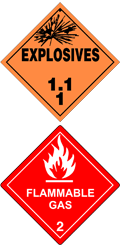 Various highways, bridges, and bridge-tunnels have size and weight restrictions or other requirements. These are below.
Various highways, bridges, and bridge-tunnels have size and weight restrictions or other requirements. These are below.
Hazardous Material (HAZMAT) Restrictions
For information on the transport of hazardous materials on highways in Virginia or through one of the six state-owned tunnels, see DMV’s “Size, Weight, and Equipment Requirements.“
For information on transporting hazardous materials through the privately owned and maintained Chesapeake Bay Bridge-Tunnel, see CBBT regulations or call 757-331-2960.
Note: The Airport Tunnel in the city of Roanoke (Route 118) is restricted to all hazardous materials. A suggested detour: Hershberger Road (Route 101) to Williamson Road (Route 11), then Peters Creek Road (Route 117).
Weight, Height or Width Restrictions at Bridges and Tunnels
Bridges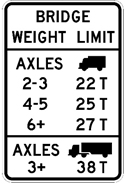
Various bridges statewide have restrictions on the weight, height, or width of vehicles. Signs posted on the highway at the affected bridges indicate these restrictions.
Find restricted bridges: To view a map showing the location of weight-restricted bridges on designated truck routes in Virginia, click here for TruckWeb.
For a current listing (updated daily) of bridges statewide posted with restricted weight limits (does not include height or width limitations), click here. The current listing has been updated to include the posting change date (last column), the ability to filter to view bridge posting changes in the last 90 days (select true on Posted Date Within 90 days), and the capability to search by route name and City/County (jurisdiction).
To receive monthly email notifications of bridge weight restricted posting changes throughout the state, sign up here!
Tunnels
 Various tunnels have height or width restrictions as follows. Signs posted on the highway at the affected tunnels indicate these restrictions.
Various tunnels have height or width restrictions as follows. Signs posted on the highway at the affected tunnels indicate these restrictions.
Trucks or other vehicles over 13 feet 6 inches high are prohibited at the Hampton Roads Bridge-Tunnel (I-64 westbound travel direction only), the Midtown Tunnel (Route 58, both travel directions), and the Downtown Tunnel (I-264, both travel directions).
Tractor-trailers wider than 8 feet are also prohibited through the downtown tunnel (I-264) in the westbound travel direction.
To avoid these restrictions use I-664 through the Monitor Merrimac Memorial Bridge-Tunnel. For more information see here.
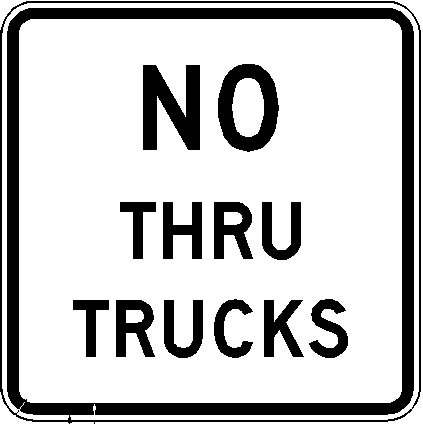 Restrictions On Length or Type of Vehicle
Restrictions On Length or Type of Vehicle
Various highways have restrictions on the length or type of vehicle (e.g. truck, tractor-trailer etc.). These restrictions are posted on the highway by regulatory signs such as “NO TRUCKS”, “NO THRU TRUCKS” , “NO TRACTOR-TRAILERS”, “NO TRUCKS OVER 65 FEET” etc.
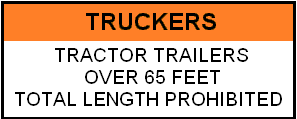 Additionally, some highways are posted with a warning sign such as “TRUCKS NOT RECOMMENDED”, “TRUCKS OVER 65 FEET NOT RECOMMENDED”, “THRU TRUCKS NOT RECOMMENDED” etc. These roads have undesirable conditions and motorists with the indicated vehicles are strongly encouraged to avoid them.
Additionally, some highways are posted with a warning sign such as “TRUCKS NOT RECOMMENDED”, “TRUCKS OVER 65 FEET NOT RECOMMENDED”, “THRU TRUCKS NOT RECOMMENDED” etc. These roads have undesirable conditions and motorists with the indicated vehicles are strongly encouraged to avoid them.
These vehicle and length restrictions are shown on the Virginia Truck Routing Map available here.
Temporary Restrictions and Incidents
Various ad-hoc restrictions can exist at any time on the highway due to weather, incidents or construction, etc. and are indicated by signs etc. posted on the highway.
For a comprehensive map and extensive other information on current highway conditions pertaining to weather, traffic, incidents, temporary restrictions, road closures, etc., go to 511virginia.org or call 511 toll free.
Restrictions on Federal Highways
Various federally maintained highways in Virginia prohibit trucks or commercial vehicles. These are the Blue Ridge Parkway (southwest Virginia), Skyline Drive (northwest Virginia), George Washington Memorial Parkway (D.C. area) and the Colonial Parkway (Williamsburg). These restrictions are posted on the various highways and shown on the Virginia Truck Routing Map.
For more details or access, contact the National Park Service.
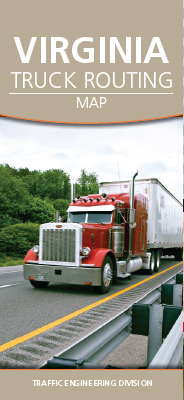 Designated (STAA) Truck Routes
Designated (STAA) Truck Routes
Certain “STAA” vehicles (Twin trailers, triple saddle mounts and automobile and watercraft transporters) are required to use the designated Surface Transportation Assistance Act (STAA) highway system for travel in Virginia. These highways are not posted with signs indicating they are part of the designated system.
This system includes the National Network (all interstates and certain primary routes), the Virginia Qualifying System (including various other state primary highways) and the Virginia Access System, which provides direct access to certain terminals.
Note: Triple saddle mount combinations more than 75 feet long (up to the maximum allowable length of 97 feet) may only travel on the National Network.
Trucks may travel up to one road-mile of travel off the National Network and Virginia Qualifying Highways (but not the Virginia Access System) to reach terminals, fuel, food, rest and repairs.
These designated highways are on the Virginia Truck Routing Map available here.
A printed version of the map is also available at major safety rest areas and welcome centers.
Special Use Permit
A special use permit can be obtained free of charge where travel by “STAA” vehicles beyond the allowable one road-mile off the designated STAA system is required to reach a terminal for delivery or pick-up.
Contact DMV's Hauling Permit Section at 804-497-7135.
For permission to access terminals off the designated system within cities and towns or in Henrico and Arlington counties, contact locality officials.
Additional Information and Resources
-
For additional questions regarding designated (STAA) truck routes, size or weight limits at bridges and bridge tunnels or other highway restrictions or limitations on state-maintained roads, contact VDOT at 800-FOR-ROAD (800-367-7623).
-
For other travel information not discussed here: see http://www.virginiadot.org.
-
US DOT numbers: Federal Motor Carrier Safety Administration at 800-832-5660
Information on national trucking regulations is available from the Federal Motor Carrier Safety Administration and the Federal Highway Administration, divisions of the U. S. Department of Transportation.



